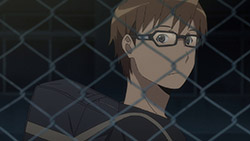 |
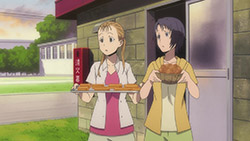 |
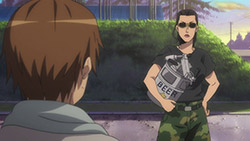 |
 |
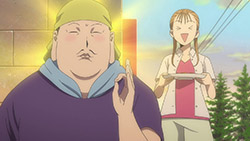 |
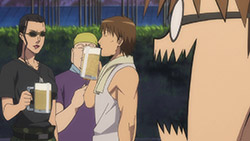 |
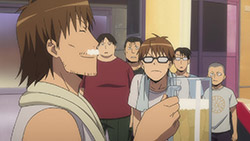 |
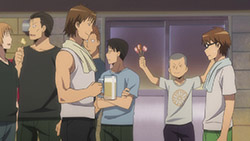 |
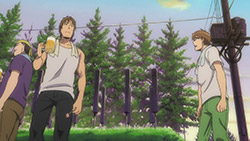 |
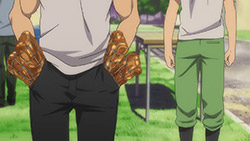 |
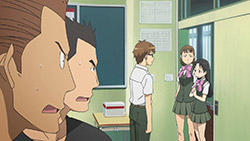 |
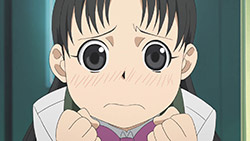 |
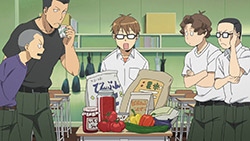 |
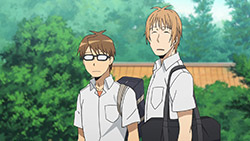 |
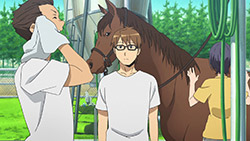 |
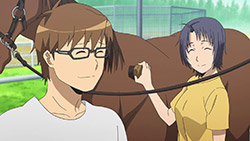 |
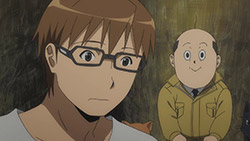 |
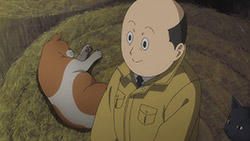 |
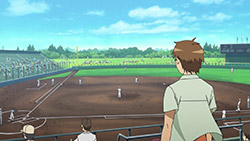 |
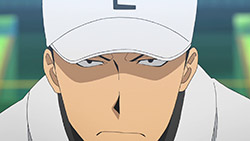 |
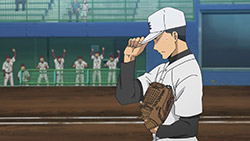 |
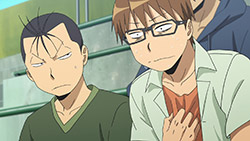 |
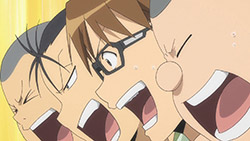 |
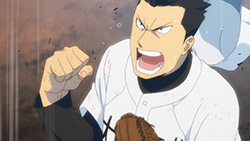 |
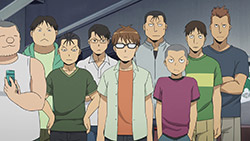 |
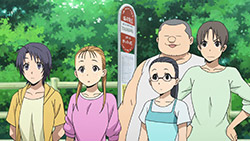 |
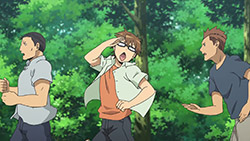 |
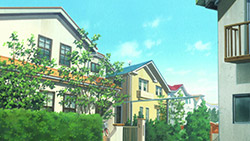 |
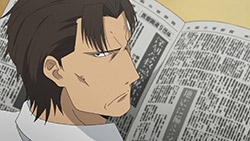 |
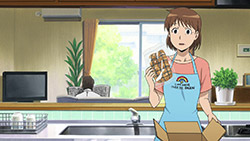 |
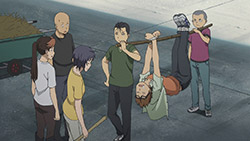 |
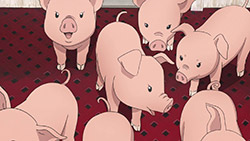 |
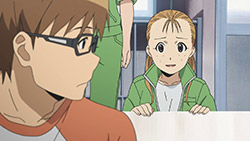 |
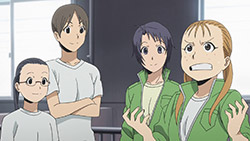 |
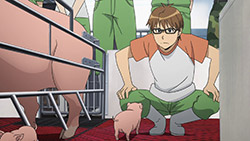 |
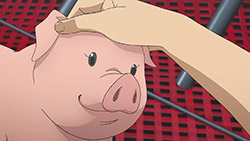 |
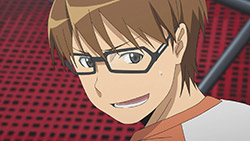 |
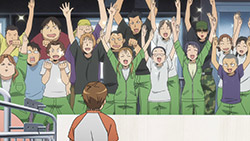 |
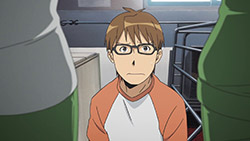 |
「走り出せ、八軒」 (Hashiridase, Hachiken)
“Run Towards The Future, Hachiken!”
There can be many reasons why a series is difficult to talk about, but sometimes it just boils down to the fact that it’s so good at speaking for itself.
Gin no Saji is a lot of things, but one of them, certainly, is a testament to one of the oldest, simplest and most important pieces of advice aspiring writers are given: “Write what you know”. Arakawa Hiromu may be one of the biggest icons of shounen manga, but here she’s delivered something that’s a very different animal. I’d argue that there are still strong shounen elements to Silver Spoon, but fundamentally this a melange of many things: a coming-of-age story, a slice-of-life, a memoir, a philosophical musing. Put them all together and you get one of the best series of 2013, and a show that’s quite unusual in the history of anime.
The “finale” of the first season of a split-cour series is always a bit of an oddball when it comes to blogging, and as is most often the case I don’t really consider this a series review post because in no sense is Gin no Saji ending with this episode. But while the story is left very much incomplete, when a studio chooses to adapt a manga in split-cour fashion there’s an implied expectation that the first final episode with have an air of finality to it – be it a cliffhanger, a milestone achieved, or a personal revelation. In this case I think it amounts to more of an epilogue – a recollection and reflection on what’s happened in the first season. There are certainly teases of what’s to come – we get our first glimpses of Hachiken’s parents, and a bombshell line of dialogue delivered quite casually in the postscript (I hope you kept watching those three minutes after the ED, because they were easily the most important part of the episode). But ultimately, it’s very much a gentle transition rather than an ending.
The upshot of all that is that in terms of plot, not all that much happened here. Hachiken finished smoking the remains of Butadon, and found himself quite the man in demand (a wayward croquette yet another indication that Mikage notices when other girls notice Hachiken). The most important part of this thread was the exchange between Hachi-kun and Shingo, where the elder brother encouraged the younger to send some of his bacon home to their parents, in addition to what he plans to send to Mikage and Komaba’s families. Not as a gesture of affection or an indication that they shouldn’t worry, but to “show them what he’s capable of”. This is an interesting dynamic – it’s pretty clear these two have far more in common than Yuugo would care to admit, but at the moment Yuugo’s not capable of separating Shingo from his parents in his mind – they’re all “the family” and thus part of the problem. We’ve only just skimmed the surface of what’s caused all this scar tissue in Hachiken – the nervous breakdown he so casually mentions at the close of the episode – and why he places so much of the blame on his family, but that will surely be a huge component of the second cour.
There’s also quite an interesting conversation between Hachiken and the Principal, as the former is performing his club duties. Hachiken reveals that he was picked on a lot in middle school, and the depth of his self-worth problem. The Principal has functioned mostly as a kind of wise observer figure rather than a true character, and this extends even to his direct interaction with Hachiken. His advice is that it’s OK to run away from your problems, because humans aren’t like farm animals in that they at least have the opportunity to do so. As usual Hachiken is more astute at assessing the troubles of others than himself; he understands that with the weight of family responsibility that they carry, many of his friends don’t have the option to run away either. While they may have a surety of purpose he feels is lacking in himself, he has a freedom that they will never have. The Principal’s assessment and advice are, as usual, preternaturally wise – that Hachiken has a special talent both for empathy and self-expression, rare in children his age, and he shouldn’t hesitate in letting those talents flower. And in a nutshell, “Don’t be so hard on yourself.”
The meat of the episode is really Hachiken living out the role this premise has cast him in: watching the others around him and reflecting both on their lives, and what they mean for his own. Komaba’s determination and passion for baseball is another life’s lesson – inspirational both for Hachiken and his classmates. Komaba is pursuing a dream that’s different from most of the Ezonoo students – and it’s one that’s almost assuredly unattainable (the odds against a high-schooler eventually becoming a pro ballplayer are truly enormous). While it hasn’t been pursued extensively in the first season, Komaba’s story is in many ways the outlier in Gin no Saji, and one that’s surely almost as relevant to the author as Hachiken’s – my suspicion is that it’s going to be a larger presence later in the series.
What closure is offered in the final episode is in the final few moments, but the irony is that in revisiting the main thread of the first cour the ultimate message is that nothing has really been resolved at all. I think these last moments are rather brilliant, actually – thoughtful, thought-provoking, elegantly simple and to the point. In the first place we have Hachiken resolving that he’s not going to name just his favorite of the new piglets, but name all of them. Why? In his own words (again, it’s hard to add much when a show speaks so eloquently for itself): “It’d be easier if I could just accept that this is how it has to be if we eat farm animals… But I just can’t do it. You can’t just accept it and get used to the fact, not once you’ve seen them.” As Fuji-sensei says, he may “grapple with this for a long time and never come up with a satisfactory answer” – but it boils down to what I said a couple of weeks ago, that it’s not a good thing for everyone who’s engaged in the practice of raising animals for meat to take the process for granted.
It seems very clear that Arakawa-sensei herself has grappled with this issue for a long time – and that she’s probably never herself found that satisfactory answer. Yohsino has become one of my favorite characters for her offbeat personality and thoughtful nature, and she frames it this way: “I can’t deny that the meat tastes good. Still – it’s an issue I’ll need to keep thinking about it I stay in this line of business. If I keep it in mind while deciding what I want to do…” She bemoans her own lack of eloquence in explaining herself – again, Hachiken has that gift far more than most – but her feelings are crystal clear. This is a truly fundamental question in terms of defining ourselves as people, and different people come up with different answers, as do different religions for that matter. But isn’t this kind of self-discovery what adolescence is really about – the act of deciding just what kind of person we’re going to be?
I see Hachiken’s act of naming “Bacon” along with all his siblings as a kind of declaration of his own individual identity. He’s come to Ezonoo, he’s had he’s eyes opened to a world he never knew existed, and he’s changed for it. But he’s also still himself – he has his own values and principles that he’s not going to surrender in order to adapt to this situation or any other. “It’s easy to find a horse that suits you… But it’s also fun to adapt your riding style to the horse.” Adolescence is the time where we grapple with the compromises we must make to become adults, and when we learn that not all of them are necessarily bad. How do we adapt and yet retain the essence of ourselves? This is Hachiken’s challenge just as it is for every young person stepping out of the shadow of their parents and trying to find their place in the world. There could hardly be a more elemental theme in anime than that, and it’s the true essence of what makes a coming-of-age story so timeless and universal.
There’s just not much flash to Silver Spoon. But there’s also no pretense – this is a series that knows exactly what it is, and never tries to be anything else. It says something for Arakawa-sensei that at the highest levels of shounen commercial influence, she would choose to go inward and leave the trappings of the genre behind. We see personal stories in anime once in a while (to some extent every writer’s work is a personal story) but this one goes beyond simply personal. The level of sincerity at the heart of Gin no Saji is remarkable, because it’s clear that the author has felt all the feelings at the heart of this story herself. It’s a reflection on the life she (and her siblings) grew up with in Hokkaido, and on the questions that life sparked in her mind. In its way this series is shounen stripped down to its essence – it’s one boy’s journey and the struggles he faces, and in effect the entire story is a training arc. But the struggles and the lessons are no more and no less than those of learning not just how to be an adult, but to be the adult we want to be. It’s a compelling, entertaining and inspirational tale than asks fascinating questions about what it means to be a human being, and I very much look forward to seeing where the story goes from here.
End Card
 |

Gotta love Aki’s reaction when everyone thought the girl was about to confess to Hachiken when she was actually coming to buy his pork.
“Buy his pork.” Hmmmmmm
Oh, she’s porked, trust me.
yeah it was pretty fun , lol could be dangerous too!
This show is amazing in it’s ability to create a true slice of life: comedy, romance, drama, pain, philosophy wrapped in a relatable story. I wound up devouring the manga, which I rarely do before watching a show because I became so intrigued by Hachiken’s, Mikagi’s and Komba’s story. Each of them is pressured by parents or situation to do something that may not be what they want, or may not be possible because that’s their reality. Now I have to watch how I comment to not introduce spoilers (rats).
AFA Hachiken naming the piglets goes, I saw it as his determination to stop running away and face hard things head-on. If he didn’t name them they can been seen as just objects He is refusing to avert his gaze from life anymore. He’s turning out to be one of the best ML I’ve watched.
What a delightfully charming series this has been :). I can’t wait for the second season to air! 😀
calling it…”Gin no Saji” anime of the year !!
* i really enjoyed watching this weekly *
Nice momentary closure for my favourite anime of this season. The way Silver Spoon handles controversial ethical topics with a high level of maturity and realism is something I’ve rarely seen in current anime. It doesn’t go the idealistic sentimental way or the harsh detached way, it balances the two polarized views out somewhere in between, not because it’s a concensus, but rather a well-thought, respectful approach as shown in the last scene.
And as was mentioned, besides the depth it’s genuinely funny, has a likeable cast, great character development for Hachiken, provides insight in agriculture so therefore I agree with the notion that Silver Spoon is one of the best series this year.
I’m happy that we’re assured of a second season and hope for more.
Hachiken’s father had one scary face. I hope that in the second season they do not portrait him as an all-evil person…
In any case, this anime is 10/10 for me. Arakawa Hiromu has huge talent.
I thought looked closer to Mikage’s dad or Komaba than Hachiken.
Too much love for this series! Gin no Saji and Servant X Service has taken the cake for me this season.
Lesson of the day: Fresh Handmade Bacon = Popularity!
If I had only known this back in the day! 😀
Hiromu Arakawa making a heartfelt series about hard work that brings you to tears about a pig destined for the slaughterhouse?
I’m astonished and at the same time completely unsurprised. She’s a great writer and artist.
Looking forward to the second season and eventual third!
One of the best shows this season; too bad it’s only 11 episodes long. Here’s to hoping that we’ll get a more regular 12-13 for season 2…
As a NoitaminA series it almost surely won’t be. The only season with 12 episodes in recent years was the Tsuritama-Sakamichi one from last Spring (and a good thing too, as that was possibly the best NoitaminA ever).
Didn’t know that it was traditional for NoitaminA to have 11…:(
I see most noitaminA shows being 22 episodes for a 2 cour and 11 for a 1 cour.
Dem bitches love dudes with bacon.
another signs of mikage showing jealousy! love it!
Looking back at Hachiken’s first visit to the pig pen, it’s amazing how different he is now and with a new piglet(okay a whole bunch of piglets) to take care of. I’m still analyzing how much he developed in that after credits scene but it’s definitely for the better. My take on it is that he can’t simply change his ways of getting attached to and naming animals raised for food, so he’ll continue to be as such, but at the same time he’s always going to be aware of their ultimate fate and will accept it. Pretty tough to do but hey, that’s how Hachiken wants to do it. If he says he can take it, then so be it. Also can’t get enough of Sukima Switch’s ending theme. I know it signals the end of an episode so I’m a little sad, but the relaxing feeling the song gives out still makes me smile.
From the looks of Hachiken’s dad I’m sensing there will be some Father/Son conflict for the next season. Can’t wait to see what happens.
Great anime and I’m curious what Hatchiken’s project for his next year will be?
Noitamina anime nonetheless to say!
Always one of the best themes EVER!
Also Hiromu Arakawa I am a HUGE fan from her !
Since Hagane she got my otaku heart!
Only ne phrase for her おつかれさまでした ^_^
Hi there, I discovered your site by means of Google at the same
time as looking for a comparable matter, your
web site came up, it appears to be like good.
I’ve bookmarked it in my google bookmarks.
Hello there, simply changed into alert to your blog thru Google, and
found that it’s really informative. I’m going to be careful for brussels.
I will appreciate should you continue this in
future. Numerous people might be benefited from your writing.
Cheers!